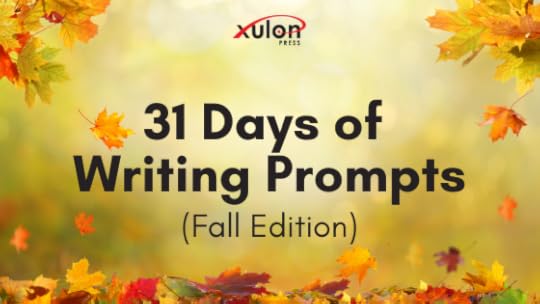Peter Lopez Jr.'s Blog: Xulon Press Blog , page 12
October 5, 2021
31 Days of Writing Prompts (Fall Edition)

Autumn is a great season to spend time journaling because we naturally begin to look back and reflect on the year. Take time to record your thoughts this month by participating in our 31 writing prompts.
As you will see there is a writing prompt for every day of the month, but don’t feel like you have to do them in order. Print the list below and select a new prompt each day. As you finish one, cross it off the list. You may even want to choose a special journal to house your thoughts this month. Happy writing, friends!
31 Writing Prompts for FallDescribe your ideal fall vacation getaway.Write down your favorite recipe to make during the colder months.What is your favorite fall memory from childhood?Write a short story about visiting a pumpkin patch.Take a walk outside with a notebook and write down what you see.Make a list of 10 things you’re grateful for.Do you have a favorite scary story? Write it down.Make a list of special fall activities you want to do this season and share your bucket list with your family or a friend and ask them to participate.Describe what a perfect fall night at home looks like for you.Write a letter to a friend and drop it in the mail.What changes have you made in your life in the past month?What changes would you like to see yourself make during the remainder of the year?Try a new recipe that features pumpkin and write your review after a taste test.Does your family carve pumpkins? If so, draw what your Jack-o-lanterns look like.If you could sit down with anyone — living or deceased — who would you choose and why?Write a letter to your younger self and bestow some wisdom you wish you knew back then.Do you have any favorite fall traditions?What has been the best part of 2021 so far?What has been the hardest part about 2021?Write a list of activities that always make you happy and can boost your mood when you’re feeling down.If you have a favorite podcast, what do you like about it?Make a list of your favorite movies to watch during the fall.What is stressing you out today?What is your favorite moment from today?Write a list of your favorite songs.What do you need more of in your life? What do you need less of in your life?Do you feel more inspired during the fall? If so, why do you think that is?Where do you hope you are this time next year?How can you make someone’s day better?Write a short story about animals on a farm.Write about something that scares you.Don’t want the creativity to stop flowing? Check out more writing prompts to keep you writing.
The post 31 Days of Writing Prompts (Fall Edition) appeared first on Xulon Press Blog, Christian Self-Publishing.
September 23, 2021
How to Host an Audiobook Club

Your parents’ version of audiobooks — think bulky cassette tapes or pricey CDs — are long gone. The audiobooks we have today are significantly more advanced. From an audiobook’s production time to the number of books we can choose from to how we consume them, it’s no wonder these orally produced books have soared in popularity in the past few years.
A boring commute and mundane house chores are now a little less of a drag on our days because we can occupy ourselves by listening to a good book.
Considering that more people are reading books by listening to them, we’re now seeing audiobook clubs begin to take off. Starting an audiobook club still has a lot of the same steps as setting up a traditional book club, but there are a few differentiators to consider.
One thing to keep in mind is that with audiobooks you now have the opportunity to decide if you want to get together to listen to the book or if you still want to listen to the book on your own time and use the book club meeting to discuss the group’s thoughts on the material. Feel free to set your intention for the group when planning or take it to a vote once you’ve formed your group. Here are a few more tips to keep in mind:
7 Tips to Start Your Audiobook Club1. Define your group’s focus.With any size group, it’s best to have an intended genre focus. This way, you’re not jumping all over the place deciding what types of books to read. Narrow your club’s focus down to fiction or nonfiction.
Ask a few interested parties what they would be more interested in reading and use their feedback to guide your decision.
2. Ask people to join.What’s a book club without participants, right? Ask friends and family members if they’d be interested in joining your book club. You can also have them extend an invite out to people they know.
If you’re looking to meet new people, you can use websites like Facebook and Meetup to find people in your area who may be interested.
3. Set your meeting frequency.Once you’ve solidified your group members, decide how frequent you want to meet, and if you want to use the group to read the book together or simply to discuss what had been read. Some book clubs will meet twice about each book. This allows them to chat about the first half of the book, and then meet again to discuss the final half and the book as a whole.
Other clubs will meet once a month and everyone will have finished reading the book beforehand. Avoid meeting too often, however, so the club doesn’t become a burden for others to attend.
4. Set your meeting space.Your meeting space can be in-person or virtually. If you want to meet in person, you can check with a local coffee shop to see if they’d mind if your group met there regularly or each member could take turns hosting the group.
If you want to meet virtually, take advantage of Zoom to bring everyone together on screen.
5. Delegate selecting books.Choosing books can be done in a few ways:
The leader can always choose the book.The group could vote on books.Each member could have a turn choosing a book.However, you decide to make your book selections, make sure to build out your reading list three to six months out and share it with the group. That way, everyone knows the reading schedule and has ample time to procure each book.
6. Decide how to find audiobooks.There are several great websites you can use to gain access to audiobooks. Libby, an audiobook app that connects to the library system, allows users to “check out” and audiobook through their library system. Keep in mind, you may still find yourself on a waitlist for an audiobook through Libby. Libraries are granted a specific number of “copies” and if they are all leased out to other users, you’ll have to wait for a copy to become available.
Another service, Scribd, is a subscription-based listening app that gives you access to books, magazines, podcasts, and more for $9.99 a month. This means you can listen to as many audiobooks as you want each month without having to spend more than $10. Scribd provides access to millions of eBooks, audiobooks, and more, but always be sure to double-check that the book you want is available through Scribd.
You can also always purchase each audiobook through a service like Audible. With Audible, you’ll subscribe to a plan that best suits your reading and financial needs. If you select the Premium Plus plan, you’ll receive one book credit each month and pay $14.95; plus, you’ll have access to stream unlimited from the Audible Plus catalog.
7. Enjoy your reading!It doesn’t matter if you have three people in your audiobook club or thirty people, the goal is simply to read great books and have fun discussing them with others. If you’re doing that, then you have a successful book club!
Want to learn more about audiobooks? Read our article “ Why Every Author Needs an Audiobook. ”
The post How to Host an Audiobook Club appeared first on Xulon Press Blog, Christian Self-Publishing.
August 12, 2021
Summer Sale Ideas for Your Book

The end of summer can tend to be a busy time for writers. This is because it’s time to check in on the current season and also prepare for the new one. A summer sale is a great way to encourage sales and make sure you meet those season sales goals while also figuring out a Fall marketing plan.
To lighten the load on you, we’ve compiled a list of 5 summer sale ideas. If your book makes for an appropriate summer read, these are sure to inspire a sales campaign perfect for the remaining summer.
Here are a few summer sale ideas for your book:Social Media Campaign“Take a picture reading [Book Title] this summer and tag the author to receive a prize [or entry to giveaway] (e.g. we’ll send free [Book Title] t-shirt to the first 30 entries!)”
You can also instruct the readers to use a special hashtag when they post the picture to keep easier track of the entries. This type of interaction can encourage book sales and increase the author’s online following. Participant’s social media following will essentially be seeing ads for the book all summer. Even readers who may already own the audiobook or ebook could be encouraged to invest in a physical copy and participate themselves.
All-Month Sale“30% Off [Book Title] Book, eBook, Audiobook, and Merch During the Last 30 Days of Summer!” (Aug. 22 – Sep. 22, 2021)
Does your book make for a perfect #summerread or #beachread? Emphasize that with a big sale! The discount and length of sale are at your full discretion; 30% on the last 30 days of summer is just one idea!
Weekend SalesWeekend Labor Day Sale! (Sep. 3 – Sep. 6, 2021)Last Weekend of Summer Sale! (Sep. 17 – Sep. 21, 2021)Just Because! (Whenever)Labor Day signals the end of summer for many. Because of that, that weekend is a popular time to shop and celebrate in the sun. If your book would make for a great #beachread that weekend, use this as a marketing tool!
1-Day SalesLabor Day Sale! (Sep. 6, 2021)Last Day of Summer Sale! (Sep. 21, 2021)
The post Summer Sale Ideas for Your Book appeared first on Xulon Press Blog, Christian Self-Publishing.
August 5, 2021
What are Plot Holes and How to Avoid Them

Plot holes can creep up in any book genre, and typically go undetected for a while. To start identifying plot holes within your work, you have to know what you’re looking for. There are a few different types of plot holes:
Continuity errorsSomething takes place that is impossibleStorylines are unresolved at the end of the bookContradictions are embedded in the writingAn illogical event takes placeNow, that we know what plot holes are, we need to know how to avoid them. The most helpful way to avoid plot holes is to revise your work with strong attention paid to the storyline and characters. Read your story as a future reader will. Question everything you come across as you read and leave notes for yourself to go back and revise.
Here are 7 other ideas to help you eliminate plot holes:1. Keep detailed notes about your characters and locations.These types of notes help you avoid continuity errors. Something as simple as accidentally changing the hair color of one of your characters can confuse readers, so continuity in your story is important.
2. Maintain revision notes for each pass you do.With each pass of revisions, you’re likely going to make tweaks that may affect future chapters in your book. To avoid big plot holes later, keep detailed notes during each revision cycle that detail exactly what you changed and in which chapter the change occurred. This is an extremely helpful index.
3. Question the logic of your plot as you self-edit.One of the best ways to check your plot is to question it as you go. Ask yourself “Does this make sense?” “Would my character do that?” “Am I moving the story too fast?” By asking yourself questions as you go, you are able to confirm that your writing choices are on point or if you have areas that need extra work.
4. Be objective about your writing.We all guard and protect our writing, and that’s a good thing. When it comes to making your writing better, however, you have to look at your work through a critical lens to ensure it is high-quality work that others will want to read.
5. Make a list of your subplots.Your subplots are another aspect of your writing that needs to be tracked. If you make a small tweak to a subplot in chapter four but don’t connect the dots to the subplot in chapter eight, you’ll accidentally create a plot hole that you may not notice.
6. Use beta readers to help you identify what you can’t see.Find readers you can test your manuscript with and ask for their honest feedback. These first-time readers will be able to spot any plot holes in your writing that leaves them guessing. These marked locations by beta readers will need extra attention from you during your revision process.
7. Hire an editor.The final step in ensuring you’ve worked out all of your plot holes is to work with a developmental editor. This level of editing is the only type that will heavily focus on the big picture of your manuscript and identify areas where you have more work to do.
Need an editor? Learn more about our editing services.
The post What are Plot Holes and How to Avoid Them appeared first on Xulon Press Blog, Christian Self-Publishing.
August 3, 2021
5 Benefits of Mastering Grammar

This question of writing skillset comes up a lot: “Do I need to be good at writing to write a book?” The answer is “yes” and “no.” In order to write a book that others want to read, writers have to understand the basics of writing and be willing to read a lot of resource books, and teach themselves how to plot out their writing in a way that readers will follow. Grammar is an important part of writing because, without strong grammar and sentence structure, a book is hard to read and comprehend.
“Well, I can just hire an editor to fix my book,” is often the first response we hear from first-time writers who may not want to take the time to invest in their craft on the front end. While this can create a speed-to-market feel for the writer, it often results in a lot more work for an editor, which ultimately may slow down the publishing process.
Plenty of writers stumble their way into writing careers; many of them often started in a different industry altogether. There are celebrities and well-known business owners who work with ghostwriters to share their messages with the world. Then, there are people who feel a tug to share their story with the world and never had any intention of putting pen to paper earlier in life.
We put together five reasons why you should master grammar as a writer. Here’s what strong grammar can do for you:
1. Allows you to invest in bettering yourself.The most important reason to devote the time to better your writing craft is that lifelong learning is extremely beneficial for your growth as a person and as a writer. You can always apply the education you gain by improving your writing to other aspects of life. For instance, learning how to better communicate through writing could lead to an opportunity for speaking engagements, podcast invites, and more.
2. Creates better readability.The stronger your grammar is, the better readability you create for your editor, and ultimately your readers. Creating a story your editor can follow along with —and enhance — leaves less room for your editor to interpret your message wrong. And the less room you can leave for error, the better your partnership will be with your editor.
3. Helps you effectively communicate your ideas.This is similar to creating better readability, but communicating your ideas effectively is more so about making sure the story you want to tell is the story you do tell. For instance, if you want to tell a story about a little boy who gets a hatchet as a gift and damaged his father’s cherry tree, and you think you’ve included the lesson within the story, but your readers end up wondering what the point of your story is, you didn’t effectively communicate with them. Increasing your writing skill set can help you identify these plot holes and fix them before your story is read by others.
4. Saves you money on editing costs.The more work you put into your story during the first draft and subsequent rewrites and revisions, the less work your editor has to do to help steer your writing in the right direction. And the less work your editor has to do to clean up your writing, the less you have to pay an editor. So, if you’re looking to significantly cut your editorial costs, do everything you can to perfect your writing so you don’t need a developmental edit for your writing and instead can opt for the line editing service instead.
5. Raises your credibility and authority.The fastest way to lose credibility and authority with your readers is to produce work they can’t follow along with or comprehend. If you don’t focus on strong grammar and allow a lot of errors to slip through in your writing, readers may begin to question if you’re qualified at all. While you may go to market a little later than you want, taking the time in the beginning to produce a strong, well-written book is the best way to get and keep readers in the long run.
If you’re looking for more ways to better your writing skills, check out our writing tips .
The post 5 Benefits of Mastering Grammar appeared first on Xulon Press Blog, Christian Self-Publishing.
July 29, 2021
How to Outline Your Fiction Novel
When it comes to outlining any book many writers go about the process very differently. Some will outline their entire novel down to the most minute details. And others will wing their entire first draft. Plus, there are a group of writers who fall somewhere in the middle; they will create a loose outline that still leaves room for characters to direct the next steps.
It’s important to say that there is no wrong way to outline a novel, and that includes choosing to not outline at all. Creative writing is about having the freedom to write and create in a way that fits you. If you’re trying to decide which type of book outlining you follow for your novel…
Here are four popular outlining methods for fiction novels. 1. Index Card MethodIf you’re a visual person, the index card method is for you. This method allows you to physically arrange every scene of your novel into chronological order. The cards can easily be taped up on a wall or spread on a surface to get the full scope of your book. You can write where the scene takes place, which characters are involved, and the outcome of the scene. This is also a great outlining method because you will have a clear picture of any scenes that may not move your story forward.
2. “Save the Cat Writes a Novel” MethodThis book has become extremely popular in the fiction-writing community because it breaks down and explains the entire novel-writing process into small, doable tasks. If this is your first time writing a fiction book, Save the Cat Writes a Novel is a beneficial resource to have at your disposal. The book teaches you to break your story down into beats, and those beats will create your story. You can couple this outlining method with the index card method if you like.
3. Create a loose outlineIf you’re riding the fence about creating an outline for your novel, try pulling together a loose outline. It can include as much or as little information as you want, but the goal is that the outline will still help ensure you’re hitting your most important points in the beginning, middle, and end of your novel.
4. Wing itThe beauty of writing a novel is that as long as you finish writing it, there is no wrong way to get to the finish line. If you’re a panster — someone who doesn’t outline your novels — more power to you. Don’t let anyone tell you that you’re writing the wrong way simply because you don’t outline. There are plenty of writers just like you in the world.
Read more about outlining your nonfiction book is easy with our tips.
The post How to Outline Your Fiction Novel appeared first on Xulon Press Blog, Christian Self-Publishing.
July 22, 2021
6 Summer Activities for Writers

Summer is officially here! Here are 6 great summer activities for writers currently working on a writing project.
Start a new project!Write something new this summer. It can be anything from a random essay using one of our summer writing prompts or even an outline for a new novel. Give your mind a rest from your current project and find inspiration for a new one.
Revise your current project.If your writing project is actually finished, summer is a great time to do some self-editing. Go back through your manuscript and tighten plot lines, build your characters, etc.
Submit your writing project.If you don’t feel you can do any more self-editing for your writing project, then maybe it’s time to start submitting it! The summer can be a perfect time to get the publishing process started on your new book.
Read a book.The summer season really is a great time to get some reading done. If you don’t have a summer reading list together yet, make one!
Build your platform.The summer is also a great time to work on connecting with your readers. This can include building your social media and creating a marketing plan for it!
Take a trip.Get out and experience the world. Whether it’s a short road trip or a week-long getaway, break the routine and see something different. If you’re lucky, you may find inspiration for your next great story!
The post 6 Summer Activities for Writers appeared first on Xulon Press Blog, Christian Self-Publishing.
July 20, 2021
10 Ways to Do Research for Your Book

When it comes to researching for your book there are many avenues — and rabbit holes — you can take to find the information you want. Researching is a fine art, especially now that the internet can turn up results that may not be completely accurate. Whether you’re writing a fiction novel or a nonfiction memoir, research will be an integral step for every book.
Since your credibility as a writer is on the line, you’ll want to be triple sure that any researched information you include is 100% factual and that you have a strong source to back you up. To avoid any book research snafus, we’ve created a list of 10 researching tips we recommend.
1. Conduct interviews.A firsthand account from a real person is a fantastic way to add depth and personality to your story. This type of research can be helpful for both fiction and nonfiction books. If your novel includes a lot of police work, and you know nothing about that world, you will find it very helpful to find an officer you can interview and fact-check specific scenarios you include in your book. If your nonfiction book is about mental health, you may find it helpful to interview several different professions that touch on mental health education and care, including therapists, psychiatrists, and doctors.
2. Watch documentaries.If you are looking for specific information on a person or location, documentaries can be beneficial. While this may not provide the full depth you need on a specific topic, it will help you understand some background information and guide you through further research.
3. Use the library.Books are still some of the strongest research documents you’ll find. From encyclopedias to books on niche topics, your library holds a wealth of knowledge that you can comb through. Is your protagonist an animal rehabilitation specialist? Check out books that detail the specific animals your protagonist rescues, so you can be sure you include factual information about each animal, and also be sure that such animal actually lives where your protagonist lives.
4. Check out official tourism websites.If your book is set in a real city, go to that city’s official tourism website and pour through its blog posts, guides, and more. It’s also extremely helpful to go and visit the city, too. That way, you can add real-life elements to your story that you may not have known to include without visiting.
5. Utilize online personality tests.When it comes to creating characters, the more in-depth into their personalities likes and dislikes, and pet peeves the better. As humans, we all have traits that are unique to us, and your characters need that, too. Online personality tests can help you begin to shape your characters.
6. Do some people watching.You can gain a lot of information — and inspiration — just by watching and listening to the people around you. You could sit at a coffee shop for a few hours a week and keep notes about the types of people you see, conversations you hear, interactions, and more. You never know when this type of research will come in handy during your writing time.
7. Don’t use Wikipedia for research.A website that can be edited by anyone needs to be completely avoided for research purposes. Since anyone can go into Wikipedia’s pages and make changes, you can never be sure that the information you pull from the website is accurate. Instead, we encourage you to only pull information from official websites.
8. Make sure you can verify statistics and other figures.This is especially important for nonfiction books, but if you are going to include statistics and other figures in your book, you must include a strong source within your book for that information. You also want to be sure your data isn’t too old. Be sure to pull the most recent statistics you can find. Your author credibility could take a hit if you aren’t careful with this type of research.
9. Use an easy-to-understand Bible translation for scriptures.While it may not be protected by copyright, quoting from the King James Version of the Bible can make it very difficult for your readers to fully comprehend the points you want to communicate. So, be sure to use a Bible translation that your readers will be more comfortable with using. With this step, always be sure you’re using scripture to support your main point and not the other way around.
10. Know when to pull back on researching.At some point, you need to be able to pull back from research and dive headfirst into actually writing your book. Writers can spend too much time researching and avoid the writing process. So, if you find your writing time is consumed by research, figure out how to separate the tasks or stop researching all together — even if it’s just for a little while — so you can get some writing done.
Writing a nonfiction book? Learn how to include your sources in a bibliography with Citations 101.
The post 10 Ways to Do Research for Your Book appeared first on Xulon Press Blog, Christian Self-Publishing.
July 15, 2021
Book Marketing Maintenance Tips
 Book Marketing Maintenance TipsYour Social Media Should Sell Your Books
Book Marketing Maintenance TipsYour Social Media Should Sell Your BooksLook at your social media profiles; Does your page bio mention your book? Are they linking to your website or blog? Do you use a consistent profile pic and user name across all platforms?
Check if Your Books Need UpdatingCould they be polished up? Do you now have reviews or awards you could add to your book cover or descriptions? If you’ve published other books you could even add an “Other books by the author” section.
Clean Up Your Website or BlogMake sure your content is still relevant, your links are updated, and check if the design needs to be freshened up! Is your headshot a recent one? Do you mention you’re working on a book with a provisional release date?
Send out an Email NewsletterSend out an email about your new book, a book sale, or just a new blog post you’ve written. Don’t have an email list? Start one!
Consider a Book Video TrailerYou can post them on your website, social media, and even play them at your book events!
Run a GiveawayGiveaways are a great way to engage your following while gaining a new one! Click here for some giveaway ideas.
Offer Your Book in Exchange for ReviewsYou can offer a free copy of your book to friends, family, or followers in exchange for a book review. Reviews sell books and you can never have enough of them.
Have Book SalesRun time-limited special offers on your book and spread the word! This will help get your book in hands of new readers.
The post Book Marketing Maintenance Tips appeared first on Xulon Press Blog, Christian Self-Publishing.
July 13, 2021
Writing With Summer Colors!

Summer is here, and it brings with it the trend of beautifully bright, fun colors. For this month’s writing challenge, we’ll be using summer colors to evoke thoughts and stories to practice creative writing. We have listed some of our favorite summer colors below, but feel free to keep this exercise going with more colors!
PeriwinklePeriwinkle takes its name from the flower and sits between the color blue and purple in the color wheel. This color emits serenity and calmness and can symbolize blossoming friendships, sentimental memories, and everlasting love. What comes to mind when you look at this color? Whether you are inspired to write a sentence, paragraph, or even an essay, take a moment to write about it.
Lemon YellowIn color psychology, lemon yellow evokes feelings of happiness, positivity, optimism, and summer. What does this color remind you of? If it’s the sun, write about a sunny day. If it’s lemonade, write about the last time you had it. Just make sure the topic you choose is authentic to your thoughts evoked by the color.
Soft FuschiaThe color soft fuchsia inspires confidence, assurance, and maturity. Think about a time you felt confident (or wish you had been more confident) and take a moment to write about it.
Emerald TurquoiseEmerald Turquoise is a color that lies on the scale between blue and green. It has characteristics associated with both of these, such as the calmness of blue and the growth in green. Similar to yellow, it can be an uplifting color. How does this color make you feel?
CoralCoral is a stronger yet paler variation of the color orange. It’s a brighter color that gains attention, which makes coral a more outgoing and social color. What comes to mind with this color?
The post Writing With Summer Colors! appeared first on Xulon Press Blog, Christian Self-Publishing.
Xulon Press Blog
- Peter Lopez Jr.'s profile
- 8 followers



